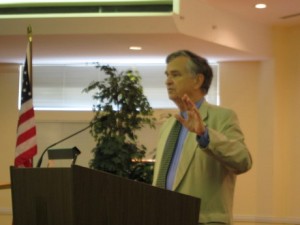
How do people get information about what’s happening in the world?
In a wide ranging recent lecture to an auditorium full of Carolina Meadows residents, Hodding Carter III, who served as Assistant Secretary of State in the administration of President Jimmy Carter and currently is University Professor of Leadership and Public Policy atUNC-Chapel Hill, said that while people over 50 continue to get most of their news from newspapers and television, younger men and women turn to more modern forms of media. A journalist by training, Carter believes that Internet-based media are rapidly replacing more traditional forms of communication.
A dangerous implication of this development is that the new media link people who think similarly. “You can escape from encountering anything you don’t already know and believe.” Targeted media close people off from one another.
In this rapidly changing world of communication, in their effort to survive, newspapers cut back on staff. Carter said that the Raleigh News & Observer, for example, no longer has skilled people to perform the basic functions of journalism. For its part, television, the other traditional mass medium, is getting dumber and dumber. “We are amusing ourselves to death.” All of which suggests that there is a crisis in the world of media. A populace needs quality sources of information in order to make intelligent decisions.
Switching gears somewhat, Carter concluded his presentation by reflecting on the upcoming presidential election. He said that four years ago, there was a high level of excitement among his college students. The Obama candidacy energized them. This year, in contrast, there is much less interest. Carter’s prediction that President Obama would not win North Carolina this year as he did four years ago prompted follow-up questions from his attentive Carolina Meadows audience.
The program was co-sponsored by two Carolina Meadows residents committees: University Speakers and World Affairs.
By Bill Powers
